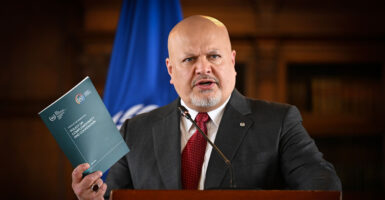One of the great qualities of the West is its belief in the directionality of history.
Many ancient cultures believed that history was circular: Native American cultures often believed that reality itself was circular; Hinduism thinks similarly. The Judeo-Christian West thought differently: that God exists outside of time, but that he guides mankind forward, step by stumbling step, toward an eschatological culmination.
This means that the West has thought, more than any other culture, about progress.
It also means that the West tends to mistake movement in time for progress, and way stations in history as endpoints. Thus, World War I was labeled “the war to end all wars” … until World War II. In the aftermath of the Cold War, Francis Fukuyama suggested the possibility of an “end of history” … until history reasserted itself along the lines of Samuel Huntington’s clash of civilizations.
The West also tends to mistake institutional forms for underlying realities. Because the West, particularly in the aftermath of the Enlightenment, has thought so much about the varieties of human institutions and their purposes, we tend to believe too much in the power of human action. This means that we often reverse cause and effect: We tend to believe, for example, that democracy precedes rights, as opposed to rights preceding democracy.
We also tend to believe that we are the creators of our own rights and responsibilities; we are, in essence, legal positivists who believe that law is created by us rather than preexisting us. For example, Woodrow Wilson posited after World War I that we ought to create a League of Nations, since “There is only one power to put behind the liberation of mankind, and that is the power of mankind.” As it turns out, that was a lot of rot.
Both of these thought errors were evident in the creation of the United Nations, which has turned out to be the “Mos Eisley” of international politics: a wretched hive of scum and villainy. Fashioned in the aftermath of World War II, when it was assumed that we had reached the end of history as well as that we had total control of our institutions, the U.N. was a shameful and immediate failure.
So, it was no surprise that this week, members of the U.N. Security Council held a moment of silence for the death of Iranian butcher President Ebrahim Raisi. The U.N. Security Council held no moment of silence for the 1,200 Israelis killed by Iranian proxy Hamas, or the thousands of American troops dead in Iraq at the hands of Iranian Shiite militias.
It was also no surprise this week that another ill-begotten international organization, the International Criminal Court, beclowned itself in truly epic fashion. The ICC was created in 1998 as yet another example of the West reaching beyond its grasp: mistaking the post-Cold War era as an era of consensus around peace and mistaking the institutions of international law for a consensus around human rights.
There is no consensus for the ICC to embody—only the power interests of some of the world’s worst players.
The ICC, to no one’s surprise, has been an enormous failure. Thanks to the possibility of its weaponization, countries, including the United States, Russia, India, China, and Israel have refused to join. And indeed, that weaponization was on full display this week when the ICC announced its intention to seek arrest warrants for Israeli Prime Minister Benjamin Netanyahu and Israeli Defense Minister Yoav Gallant for their extraordinarily careful and defensive war against Hamas.
Once again, the world has proved that there is no international “community” and no international “law.” There is only national self-interest. Pretending otherwise doesn’t forward the cause of decency or human rights. It impedes it and gives credibility to those who seek to turn the West’s hopeful vision against itself—and who succeed in doing so regularly.
COPYRIGHT 2024 CREATORS.COM
The Daily Signal publishes a variety of perspectives. Nothing written here is to be construed as representing the views of The Heritage Foundation.

























